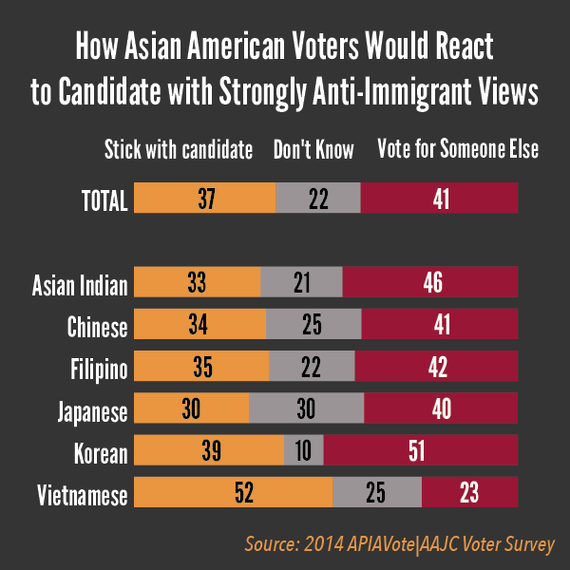Cross-posted from AAPI Data
Last week, Jeb Bush and Carly Fiorina came under fire for their offensive comments on Asian immigrants. Bush noted in his visit to border city McAllen, Texas, that the phenomenon of so-called "anchor babies" was "frankly, more related to Asian people," while Fiorina called in Le Mars, Iowa for the urgent resolution of "festering problems" like the Chinese birth tourism industry in the United States.
This brings up an important question of whether anti-immigrant rhetoric could hurt candidates among Asian American voters. In the 2014 APIAVote & Asian Americans Advancing Justice | AAJC 2014 Voter Survey of registered Asian American voters, for which AAPI Data provided research support, respondents were asked:
"If a political candidate expressed strongly anti-immigrant views, but you agreed with him or her on other issues, would you still vote for that candidate, or would you vote for someone else?"
As the results indicate, 41 percent of registered Asian American voters indicated that they would vote for someone else, while 37 percent said they would stick with their candidate, and 22 percent said they didn't know. These results were similar across detailed Asian subgroups, with two notable exceptions: Korean Americans were more likely than the Asian American average to say that they would vote for someone else, while Vietnamese American voters largely said that they would stick with their candidate.
- There were significant differences by party identification. 49 percent of those who identified as Democrat (or leaned that way) said they would switch their vote, while 32 percent of Republican identifiers and leaners said they would do so. Among those who said they did not identify with either party, 35 percent said they would vote for someone else.
- Survey respondents were asked about anti-immigrant views, and not anti-Asian views in particular. Thus, it is possible that the results would be even stronger in the current political primary context than in prior political contexts with more general anti-immigrant rhetoric.
- Survey respondents were asked a similar question about candidates who express strong views about Christian values: If a political candidate expressed strong views about Christian values, and you agreed with him or her on other issues, would you still vote for that candidate, or would you vote for someone else?Only 28 percent said they would vote for another candidate, while 54 percent said they would still vote for their candidate, and 18 percent said that they didn't know.
